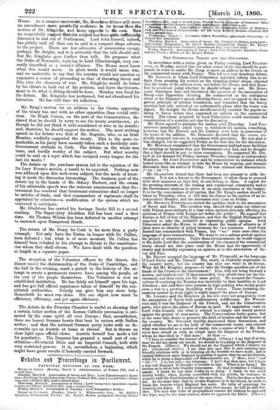Mr. Byng's motion for an address to the Crown approving
of the treaty has met with no other opposition than verbal criti- cism. Sir Hugh Cairns, on the part of the Conservatives, de- clared that he should be sorry to see the treaty overthrown, al- though he did not think it well-considered or wise in its details ; and, therefore, he should support the motion. The most striking speech in the debate was that of Mr. Maguire, who, as an Irish Member, cordially supported the treaty. This is ihe more re- markable, as his party have recently taken such a decidedly anti- Government attitude in Cork. The debate on the whole was tame, and hardly worthy of the subject. But what novelty could be said on a topic which has occupied every tongue for the last six weeks ?
The debate on the purchase system led to the rejection of Sir De Lacy Evans's motion, a result to be expected. Nothing new was adduced upon this well-worn subject, but the mode of treat- ing it made the discussion interesting. The business part of the debate lay in the hands of Mr. Sidney Herbert, and the cream of his admirable speech was the welcome announcement that Go- vernment has resolved that lientenant-colonelcies shall no longer be articles of trade, and that commanders of regiments shall be appointed by selection—a modification of the system which we ventured to anticipate.
Mr. Gladstone has carried his Savings Banks Bill to a second reading. The Paper-duty Abolition Bill has been read a first time. Sir Thomas Wilson has been defeated in another attempt to encroach upon Hampstead Heath.


























 Previous page
Previous page